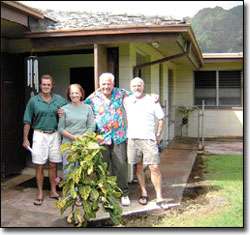A 24-hour in-treatment drug and alcohol treatment facility in Kapahi could open as early as January.
Hanamana, meaning “spirit at work,” would open in the former Wong Care Home on Kawaihau Road with 12 women’s beds, growing eventually, as long as the center receives its county planning use permit when it goes before the Kaua’i Planning Commission on November 25 and passes inspection.
“We are shooting for January, 2004, but early spring, for sure,” said Hans Tangelder, Executive Director and founder of Hanamana, which expects to house 12 women and 23 men in the 10,000 square foot building as renovations are completed.
They are starting with a dozen women in one wing because it needs less work to fix, said Tangelder, who took TGI on a tour of the grounds last week.
“This place is in good shape,” Tangelder said. “But it needs a little work.”
Tangelder, who has been working on the project for two years, moved on-site less than a month ago to further work on the building. The former Wong Care Center, which closed at the beginning of this year, needs plumbing and roofing repair. The kitchen still has its original ovens, and there is plenty of furniture left over from the Wong days.
A Wong’s menu still hangs on the wall in the kitchen, and adjustable bed skeletons still sit in empty rooms.
“It was eerie,” said Tangelder. When the former tenants moved, they left pretty much everything, he said. In the future recreation and meeting room, old bedding still hangs around on a musty couch.
But with a little work and help from the Planning Commission, the building will be thriving again.
“We need to get the process going,” said Tangelder.
With help from donations, Tangelder and his staff have painted a number of the rooms, and expects to get a plumber and roofer to donate their time to fix some of the leaks. But all this depends on the decision of the Planning Commission.
Tangelder, though, isn’t too worried.
“Everything’s moving pretty smoothly,” he said. Out of thirty letters sent out to neighbors, only three had reacted negatively, he said.
And of the three, only one still does not support Hanamana’s presence.
“We are trying to do our best for our neighbors. This will be a calm, peaceful place,” Tangelder said. “We are sensitive to the needs of our neighbors.”
And the entire island needs the treatment center, Tangelder said.
“We’re here to serve a need,” said Tangelder. “It’s a team effort.”
One crucial member of the team is already aboard. Tali McCall, a Master’s Degree holder and a Ph.D. candidate, currently at Keiki Ohana Therapeutic Services in Anahola, has accepted the program director position, and Tangelder hopes to hire a few more qualified counselors in the coming weeks. He expects that the center will have around a half-dozen employees by the time Hanamana opens.
The treatment center, which will be run by McCall on a daily basis while Tangelder handles the financial matters, will use a combination of 12-step programs and Rational Recovery, which combines recovery with physical, art, and other therapies.
“Our comprehensive program, although born from the proven methods and results of the standard 12-step programs , R.R., and other successful and approved formats, also includes modern life skills teaching centered in the spirituality of self-awareness to help create a lasting relationship with the desired results of healthy, happy, and addiction-free living for all our patients/graduates,” Hanamana’s mission statement said.
Tangelder said that he was a businessman who got frustrated when he spent nine months trying to get a friend into treatment. She eventually had to go to the Mainland for rehabilitation.
“It was crazy. She had to go off-island, and no one could visit her,” he said.
“This needs to be done, and I needed a purpose,” he added.
Tangelder has already received a number of private donations, although the non-profit is accepting donations.
“Everybody is pretty much volunteering their time right now,” said Tangelder, adding “We’re not here to make a profit.”
The 28-day program will cost between $4,800 and $5,000, he said.
Wong Care Home, which opened in 1975, provided a refuge for Kauaians with mental illness, those who were developmentally disabled and others with behavioral problems.
While there are a number of out-patient groups and centers on Kaua’i, there hasn’t been an in-patient drug and alcohol treatment center since 1991, said Roy Nishida, the county anti-drug planning coordinator, at the anti-drug planning forum on November 8.





